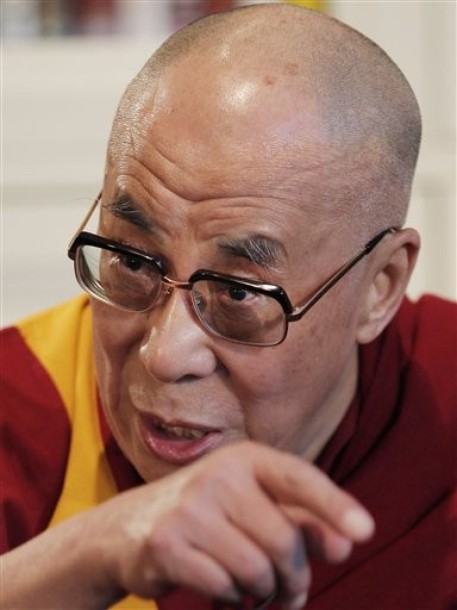 Dharamshala: On Sunday, 30 October 2011, The spiritual leader of Tibet His Holiness the Dalai Lama gave his first public teaching since arriving in Japan, at the Mainishi arena in Osaka, which saw over 5,000 Japanese and nearly 400 Koreans in attendance.
Dharamshala: On Sunday, 30 October 2011, The spiritual leader of Tibet His Holiness the Dalai Lama gave his first public teaching since arriving in Japan, at the Mainishi arena in Osaka, which saw over 5,000 Japanese and nearly 400 Koreans in attendance.
He began with a teaching on 'Heart Sutra: From Emptiness to Compassion', to a warm and welcoming audience, extremely grateful to learn from the Tibetan master. Reciprocating their warmth, His Holiness humbly responded, "I am very happy to be here in Japan and meet spiritual friends,".
Although he is grieved by the horrific incidences of self-immolation and the injustices of the Chinese in Tibet, His Holiness maintains that peaceful mind and secular ethics of love, compassion and morality are the keys to creating a century of peace and bringing about a social transformation.
Commenting on the problems of the world, he said that material progress alone could not bring about lasting peace and happiness in this world, and that corruption and the rift between the rich and poor are the biggest ailments of society today. "The 20th century which brought tremendous technological progress and physical comfort, also saw unimaginable destruction and death of over 200 million people due to violence. The Japanese people also underwent similar suffering after the bombing of Hiroshima and Nagasaki during the Second World War," he added.
"The Japanese people have made immense material development, now they should make progress by introducing academic research into the study of mind and secular ethics".
His Holiness also spoke of religion as playing a pivotal role in bringing about peace of mind, and said that all religions preached common virtues- those of love, compassion, tolerance and forgiveness. He said that peaceful existence was possible by preserving and respecting one's religion, while also respecting those of others. "You must analyze and check Buddhism. It's not only a matter of tradition and recitation; that's only on the surface", he said.
"The essence of emptiness," he concluded, "is that everything depends on everything else. "And in Japan," he went on, "you have advanced science, but you can't buy inner peace with science. You've invented lots of cameras, but the camera doesn't reflect your mind. Not yet!"
Later in the afternoon, the Dalai Lama delivered a public talk at the same venue on the strength to overcome life's difficulties. He spoke over the allotted 40 minutes, answering the questions of rapt devotees about a variety of issues and patiently clarifying or explaining parts of the texts to them.
Upon his arrival in Japan, His Holiness also answered queries of the Japanese media regarding not only his visit but also about the change in Chinese leadership, the self-immolations and the issue of his succession.
His Holiness did not wish to comment on the Chinese political situation, saying that he had retired his political leadership. He did say, "When Hu Jintao took over, many expected positive changes.....Ten years have passed, you know better whether there is harmony in China or not now. 2008 incidents in Tibet, 2009 in Uigyur and 2011 in Inner Mongolia speak the reality. Goal of harmonious society is good, but the method employed is wrong. Harmony must come from heart, key factor is trust. But trust and fear cannot go together. So, it is too early to say that the next leadership will bring big change".
When asked about the self-immolations, he said "It is a sign of deep desperation and the Chinese leaders need to look into these incidents more seriously. Ruthlessness only will not be good for all."
As for his recommendations about the stance of the Japanese government toward Tibet, His Holiness responded that Tibet is "a moral issue of justice" and Japan is a democratic country, thus it was a matter better decided by the Japanese people and media.
In an interview with His Holiness' representative in East Asia and Japan, said: "The interest in His Holiness the Dalai Lama's teachings during his visits among the Japanese people, including youngsters and the intellectuals, is ever growing." This was evident by the large, engrossed audience that listened to his teachings on the first day in Osaka.
Mr Tshoko also said that the people of Japan have expressed their deep appreciation for His Holiness, the Dalai Lama for visiting their country over the last many years. The purpose of this 11th visit to Japan by his His Holiness, was to offer his condolences to the victims of the natural disaster that rocked the country earlier this year. Shaken by the record-breaking earthquake and tsunami that hit in April, causing immense damage and loss of human life, the people of Japan felt extremely alleviated by the presence of the spiritual leader in their country.
His Holiness is further scheduled to visit Koyasan, Sendai, Ishinomaki and Koriyama for a series of public talks and discussions with young monks and scientists.


![Tibet has a rich history as a sovereign nation until the 1950s when it was invaded by China. [Photo: File]](/images/stories/Pics-2024/March/Tibet-Nation-1940s.jpg#joomlaImage://local-images/stories/Pics-2024/March/Tibet-Nation-1940s.jpg?width=1489&height=878)















